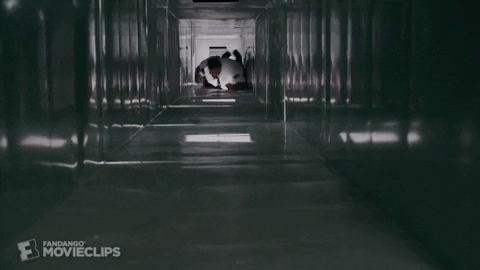15 Things Movies Have Tricked You into Believing

Whether it’s a stunning action flick, a Christmas feel-good movie, or a space-invader thriller, Hollywood movies never fail to impress. Movies like Apollo 13 and Jurassic Park have made audiences believe that they can be amazed at real-life experiences or see something fantastic that they didn’t know existed. But sometimes Hollywood tries to pull the wool over our eyes and shows us the things that are fully fabricated. Want to know how certain objects are just creations of the producer’s mind and are far away from reality? Here are some popular movie myths debunked!
1 Air conditioning ducts are an easy way to sneak through buildings.
Everyone fell in love with Paul Blart, the Mall Cop hero played by Kevin Jame in that 2009 American comedy. The scene showing him crawling through the air vent passageway and eventually sliding out of it after making plenty of movement was funny, though.
But are air-vent passageways just like as shown in live-action movies? Can you crawl in the vent and use it easily to sneak through a building? Well, the HVAC system scenes don’t really exist like that in real life. To begin with, the passageway in the duct unit is wide enough to enable someone to pass through it.
However, there are certain obstacles like fans or blowers you can collide with along with a lot of weak sections that you can fall through. For instance, your head can undergo a collision with the duct sealing, eventually leading to major injuries. Moreover, there is a lot of dirt and debris inside the vent unit that can take a serious toll on your respiratory system. (source)
2 Knocking people out with a blow to the skull or jaw is a harmless way to temporarily incapacitate.

Boxing movies like the cult classic, Rocky, might have made you a forever fan of Sylvester Stallone. The film series features action scenes where the actor punches someone’s jaw or skull upon which the person wakes up after a temporary downfall.
In real life, scenarios can be a lot different. A person who has been punched might experience a lot of trauma. They may or may not lose consciousness, but their cognitive functions can be impaired.
Such a person will experience the effects of concussion which can lead to memory loss. If the hit person becomes dizzy and falls, they may hit their head on the ground, and this can result in a fractured skull.
What’s worse is that if they get a depressed skull fracture, the broken skull will press into the brain, creating further trauma. So, one punch in the jaw or skull can be enough to kill someone or cause permanent, life-altering damage. (1, 2)
3 You can outrun a giant explosion.

A “run away from an explosion” scene is the hallmark of almost every action-adventure movie. Heroes like James Bond and Jason Bourne are often seen outrunning a deadly explosion. But explosions are not a common thing to walk away from.
In real life, movie-type blasts require an explosive such as TNT or C-4. Such materials cause explosions when they combine with oxygen. Let’s take C-4 for example. When ignited using a detonator, it will burn and release several gasses with great force.
These gasses engulf the surrounding space in a heartbeat and explode in a blast strong enough to blow away people, trees, cars, and everything else in its path.
So, can you outrun an explosion in real life? The answer is…NO! But it may also depend on your proximity to the explosion and how fast you run. In case of a C-4 explosion, gasses are released at an exceptional speed of 26,400 feet per second, devouring everything in its path. Assuming you are within this distance from the deadly explosive, you will get hit by the explosion in seconds. (source)
4 Hackers use a real-time, 3D interface that looks cool or a bunch of slick-looking interfaces, and windows that pop up as they’re hacking in.

Be it signaling the entire country or sending deadly viruses, these are things that only onscreen hackers can do. But we can’t resist saying that the hacking scenes in certain movies can be everything from hilarious to infuriating. Plus, they are so unrealistic that it’s hard not to overlook their details.
For example in The Warlock, a legendary computer hacker in the 2007 action-thriller flick “Live Free or Die Hard†had the most fanciful network farm in a basement.
No matter how seriously he showed off his hacking technology, it’s foolish to assume that hackers require extravagant hardware to hack devices. Real-life hacking is all about decoding complex lines of codes rather than systems with unconventional details. (source)
5 CPR brings practically anybody back to life, no matter what happened to them.

Hollywood may not have done everything right, especially when it comes to performing life-saving techniques like cardiopulmonary resuscitation, aka “CPR.” Remember the resuscitation scene in “The Hunger Games: Catching Fire†where Peeta gets a shock and is thrown with great force backward? Finnick immediately begins CPR giving breaths and compressions to breathless Peeta. Peeta eventually takes a gasp of air and gets up perfectly fine.
In real life, CPR doesn’t work in every case. Most instances of CPR for cardiac arrest are found to be unsuccessful. According to experts, CPR doesn’t restart the heart but is simply a way to keep blood flowing through the victim’s body until an emergency medical team arrives and takes over.
And this type of life-saving technique can be undertaken only by trained individuals. Despite what movies would have you believe, nearly 40% of victims brought back from cardiac arrest via CPR have instant survival and end up in a hospital. However, only 10-20% will survive long enough to get discharged. (source)
6 When people drown or are drowning, there’s a lot of noise and flailing about.
Drowning scenes are intriguing yet far from reality in certain Hollywood movies. Case in point, the pool rescue scene in the 1992 flick Beethoven. In the scene, Sarah Rose Karr who played the role of Emily falls in a pool, and a slobbering St. Bernard named “Beethoven†rescues her after hearing the noise coming from the pool when he was situated far away.
The drowning movie myths debunked by experts clearly state that drowning occurs silently and rapidly, unlike shown in movies. The signs of a person drowning are much more subtle. There’s a prototypical behavior that is virtually silent, and it won’t be recognized by watching swimmers unless they are trained lifeguards.
Contrary to popular belief, the drowning person makes discrete sounds and subtle movements that cannot be easily detected by passersby. In fact, many times drowning occurs when someone is watching. That means the scenario often doesn’t look like drowning at all. Moreover, when someone is drowning, he or she won’t be able to scream because they are already working to get air when coming up to the surface. (source)
7 It only takes seconds to knock someone out with a rag soaked in chloroform.

The chloroform-soaked rag is a popular go-to weapon used in Hollywood movies to incapacitate a person. Movies like P2 and Billion Dollar Brain have shown a rag soaked in chloroform knocking a person in a non-lethal manner.
A cloth is put over someone’s mouth, and he or she falls unconscious in seconds. In reality, things are the other way around. Scientists estimate it is nearly impossible to incapacitate someone in this manner.
While chloroform can be used to knock people unconscious, it would take at least five minutes of inhaling an item soaked with the knockout drug. Also, knocking people out using such drugs is a tricky process. While too little of the drugs will be ineffective, too much will be harmful. (source)
10 Times the Myths of the Mythbusters Did Not Make It to the Us Tv Screens
























